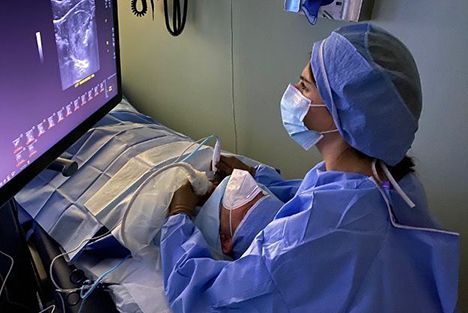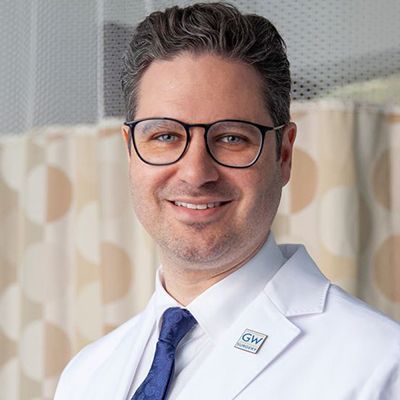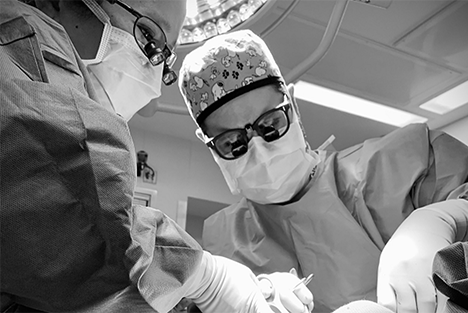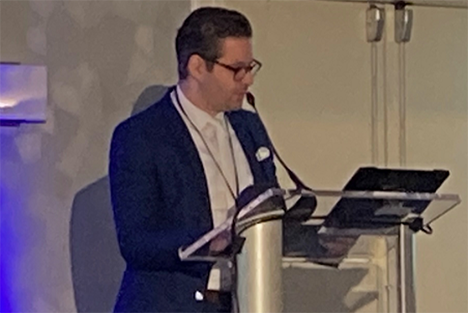Welcome to GW Medicine’s Center for Minimally Invasive Treatment for Thyroid Disease, a multidisciplinary team dedicated to offering the full breadth of available thyroid treatments. We are uniquely capable, as a team—Dr. Salem Noureldine, endocrine surgeon, and Dr. Chelsey Baldwin, medical endocrinologist and thyroidologist—to offer state-of-the-art techniques to achieve patient-tailored care for thyroid disease.
What Minimally Invasive techniques are offered at GW Medicine’s Center for Minimally Invasive Treatment for Thyroid Disease?
Ethanol Ablation is a well-studied technique for the treatment of symptomatic nodules that are predominantly cystic. Ethanol ablation is a simple outpatient procedure that can significantly shrink cystic thyroid nodules allowing for relief of symptoms and avoidance of surgery.
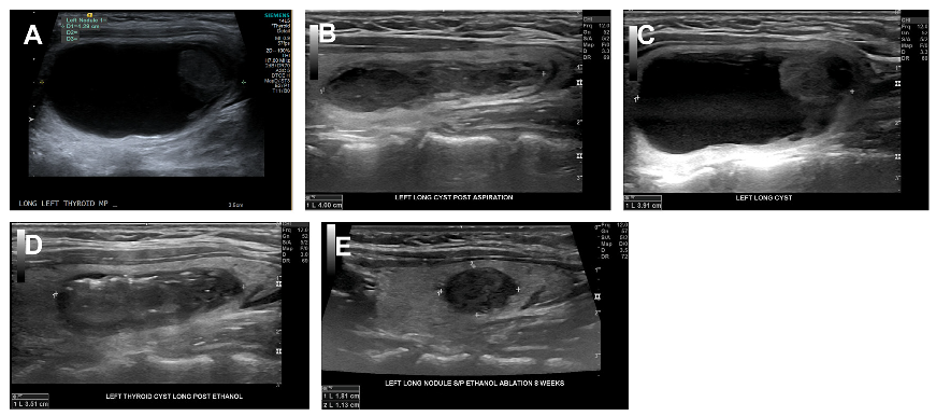
Ethanol Ablation: A cosmetically bothersome left –sided predominantly cystic nodule (A) Initial ultrasound evaluation (B) following simple aspiration (C) Reaccumulation of cystic fluid, typical following simple aspiration (D) Immediately changes following ethanol ablation (E) sustained benefit of ethanol ablation.
Radiofrequency Ablation (RFA) is a modern, minimally invasive technique used to treat benign thyroid nodules, autonomous (functional) thyroid nodules, and select thyroid cancers. It utilizes high-frequency electrical currents to generate heat, which precisely targets and reduces the size of thyroid nodules without the need for traditional surgery.

Radiofrequency Ablation: Right sided nodule (A) before RFA (B) immediately post-RFA demonstrating classic ultrasonographic changes (C) 4- months post – RFA demonstrating clinically significant volume reduction.
What Thyroid Conditions do we treat?
- Symptomatic Benign Thyroid Nodules
-
Most thyroid nodules are benign. However, even benign nodules can be problematic for some patients. Nodules that are large can cause symptoms like fullness, positional discomfort, difficulty swallowing or speaking, and cosmetic concerns. Some benign nodules show a trajectory of continued growth and patients would like to intervene to prevent further complications or future need for surgical intervention. Radiofrequency ablation is effective at reducing the size of thyroid nodules, alleviating symptoms and preventing the need for surgical intervention, all while preserving thyroid function.
- Autonomous (Functional) Thyroid Nodules
-
A subset of benign thyroid nodules can over produce thyroid hormone which can lead to overactive thyroid (hyperthyroidism). Many patients with autonomous (functional) thyroid nodules will require treatment to normalize thyroid hormones which can include lifelong medication, radioactive iodine, or surgery. RFA offers an additional option to patients who may wish to avoid medication or surgery for the management of their autonomous (functional) thyroid nodules.
- Select Thyroid Cancer
-
In the appropriately selected patients, RFA can offer an alternative method for managing low-risk papillary thyroid cancers. Patients have historically been offered surveillance or surgery for the management of thyroid cancer. However, radiofrequency ablation has been shown to be an effective thyroid-sparing alternative for the management of select thyroid cancers.
Patient Experience: What to Expect
Consultation
Your journey begins with a comprehensive consultation, where you will discuss your medical history, symptoms, and treatment goals. Request your consultation below.
Procedure
During the RFA session, a local anesthetic is administered to ensure your comfort. Using ultrasound guidance, the RFA probe is precisely positioned to target the thyroid nodule.
Post-Procedure Care
After the procedure, you will be monitored briefly before being discharged. Detailed aftercare instructions will be provided to support a smooth recovery. In the year following the procedure, your physician will monitor your treatment response with clinical and ultrasonographic evaluations.
Patient Resources:




